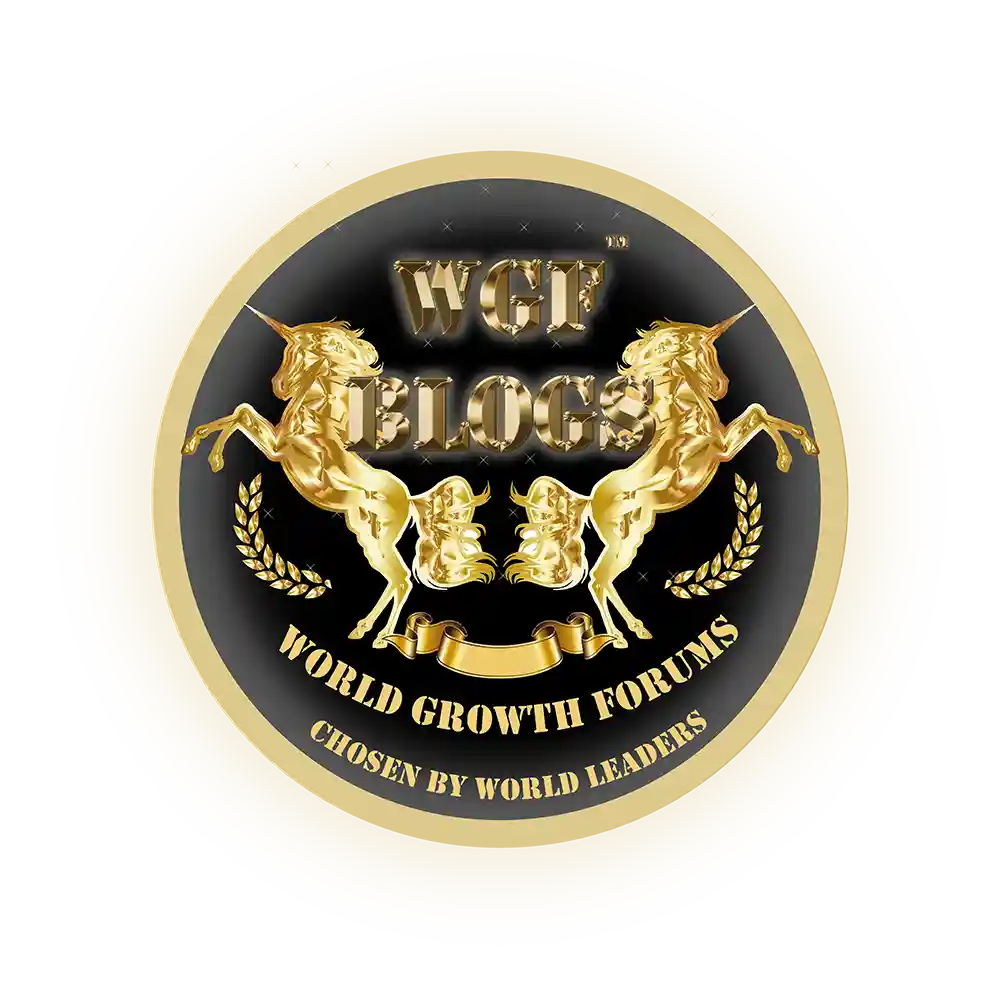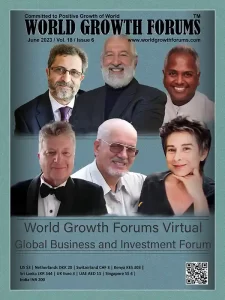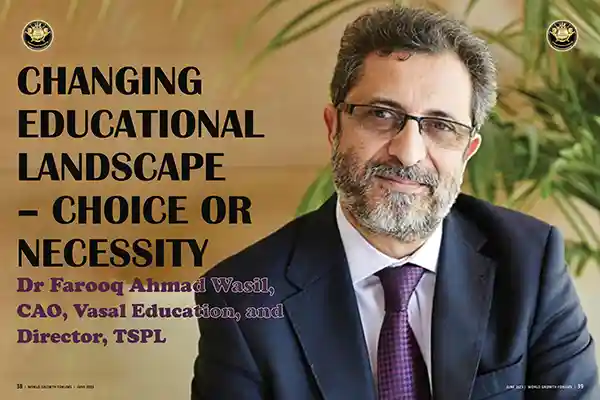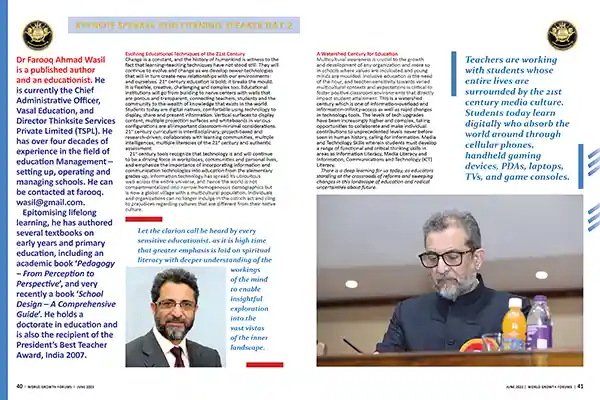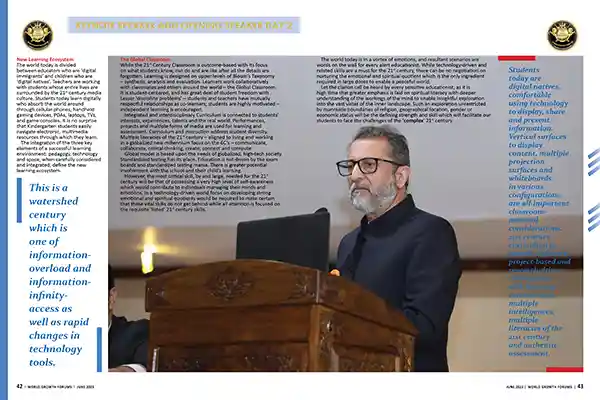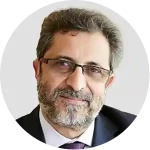
Dr Farooq Ahmad Wasil,
Chief Administrating Officer, Vasal Education,
and Director,
Thinksite Services Private Limited (TSPL)
WGF World’s Top Nation Builders
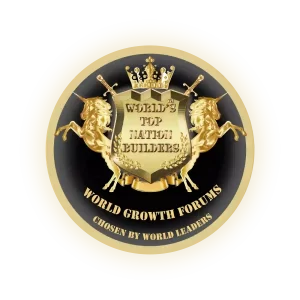
World Growth Forums Magazine June 2023
WGF Virtual Global Business and Investment Forum
Changing Educational Landscape – Choice Or Necessity

By Dr Farooq Ahmad Wasil
Chief Administrating Officer, Vasal Education,
and Director,
Thinksite Services Private Limited (TSPL)
Dr Farooq Ahmad Wasil is a published author and an educationist. He is currently the Chief Administrative Officer, Vasal Education, and Director Thinksite Services Private Limited (TSPL). He has over four decades of experience in the field of education Management – setting up, operating and managing schools. He can be contacted at farooq.wasil@gmail.com.
Epitomising lifelong learning, he has authored several textbooks on early years and primary education, including an academic book ‘Pedagogy – From Perception to Perspective’, and very recently a book ‘School Design – A Comprehensive Guide’. He holds a doctorate in education and is also the recipient of the President’s Best Teacher Award, India 2007.
Evolving Educational Techniques of the 21st Century
Change is a constant, and the history of humankind is witness to the fact that learning–teaching techniques have not stood still. They will continue to evolve and change as we develop newer technologies that will in turn create new relationships with our environments and ourselves. 21st century education is bold; it breaks the mould. It is flexible, creative, challenging and complex too. Educational institutions will go from building to nerve centers with walls that are porous and transparent, connecting teachers, students and the community to the wealth of knowledge that exists in the world. Students today are digital natives, comfortable using technology to display, share and present information. Vertical surfaces to display content, multiple projection surfaces and whiteboards in various configurations are all-important classroom-minimal considerations. 21st century curriculum is interdisciplinary, project-based and research-driven; collaborates with learning communities, multiple intelligences, multiple literacies of the 21st century and authentic assessment.
21st century tools recognize that technology is and will continue to be a driving force in workplaces, communities and personal lives, and emphasize the importance of incorporating information and communication technologies into education from the elementary grades up. Information technology has spread its ubiquitous web across the entire universe, and hence the world is not compartmentalized into narrow homogeneous demographics but is now a global village with a multicultural population. Individuals and organizations can no longer indulge in the ostrich act and cling to prejudices regarding cultures that are different from their native culture.
Let the clarion call be heard by every sensitive educationist, as it is high time that greater emphasis is laid on spiritual literacy with deeper understanding of the workings of the mind to enable insightful exploration into the vast vistas of the inner landscape.
A Watershed Century for Education
Multicultural awareness is crucial to the growth and development of any organization and more so in schools where values are inculcated and young minds are moulded. Inclusive education is the need of the hour, and teacher-sensitivity towards varied multicultural contexts and expectations is critical to foster positive classroom environments that directly impact student attainment. This is a watershed century which is one of information-overload and information-infinity-access as well as rapid changes in technology tools. The levels of tech upgrades have been increasingly higher and complex, taking opportunities to collaborate and make individual contributions to unprecedented levels never before seen in human history, calling for Information. Media and Technology Skills wherein students must develop a range of functional and critical thinking skills in areas as Information Literacy, Media Literacy and Information, Communications and Technology (ICT) Literacy.
There is a deep learning for us today, as educators standing at the crossroads of reforms and sweeping changes in this landscape of education and radical uncertainties about future.
Teachers are working with students whose entire lives are surrounded by the 21st century media culture. Students today learn digitally who absorb the world around through cellular phones, handheld gaming devices, PDAs, laptops, TVs, and game consoles.
Click Here to Access More World Leaders…
New Learning Ecosystem
The world today is divided between educators who are ‘digital immigrants’ and children who are ‘digital natives’. Teachers are working with students whose entire lives are surrounded by the 21st century media culture. Students today learn digitally who absorb the world around through cellular phones, handheld gaming devices, PDAs, laptops, TVs, and game consoles. It is no surprise that Kindergarten students easily navigate electronic, multimedia resources through which they learn.
The integration of the three key elements of a successful learning environment: pedagogy, technology and space, when carefully considered and integrated, define the new learning ecosystem.
This is a watershed century which is one of information-overload and information-infinity-access as well as rapid changes in technology tools.
The Global Classroom
While the 21st Century Classroom is outcome-based with its focus on what students know, can do and are like after all the details are forgotten. Learning is designed on upper levels of Bloom’s Taxonomy – synthesis, analysis and evaluation. Learners work collaboratively with classmates and others around the world – the Global Classroom. It is student-centered, and has great deal of student freedom with Lesser ‘discipline problems’ – students and teachers have mutually respectful relationships as co-learners; students are highly motivated – independent learning is encouraged.
Integrated and interdisciplinary Curriculum is connected to students’ interests, experiences, talents and the real world. Performances, projects and multiple forms of media are used for learning and assessment. Curriculum and instruction address student diversity. Multiple literacies of the 21st century – aligned to living and working in a globalized new millennium focus on the 6C’s – communicate, collaborate, critical thinking, create, connect and compute.
Global model is based upon the needs of globalized, high-tech society. Standardized testing has its place. Education is not driven by the exam boards and standardized testing mania. There is greater potential involvement with the school and their child’s learning.
However, the most critical skill, by and large, needed for the 21st century will be that of possessing a very high level of self-awareness which would contribute to individuals managing their minds and emotions. In a technology-driven world focus on developing strong emotional and spiritual quotients would be required to make certain that these vital skills do not get behind while all attention is focused on the requisite ‘listed’ 21st century skills.
Students today are digital natives, comfortable using technology to display, share and present information. Vertical surfaces to display content, multiple projection surfaces and whiteboards in various configurations are all-important classroom-minimal considerations. 21st century curriculum is interdisciplinary, project-based and research-driven; collaborates with learning communities, multiple intelligences, multiple literacies of the 21st century and authentic assessment.
The world today is in a vortex of emotions, and resultant scenarios are words on the wall for every alert educationist. While technology-driven and related skills are a must for the 21st century, there can be no negotiation on nurturing the emotional and spiritual quotient which is the only ingredient required in large doses to enable a peaceful world.
Let the clarion call be heard by every sensitive educationist, as it is high time that greater emphasis is laid on spiritual literacy with deeper understanding of the workings of the mind to enable insightful exploration into the vast vistas of the inner landscape. Such an exploration unrestricted by manmade boundaries of religion, geographical location, gender or economic status will be the defining strength and skill which will facilitate our students to face the challenges of the ‘complex’ 21st century.
